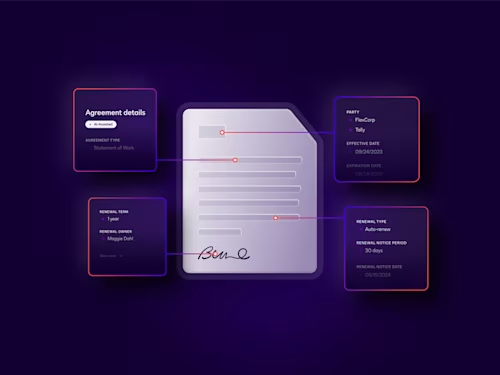
Are Remote Online Notarizations Recognized in All States?
States are increasingly authorizing remote online notarization (RON), making notarial services far more accessible and efficient.

States are increasingly authorizing remote online notarization (RON), making notarial services far more accessible and efficient. RON involves the use of audio-visual technology in conjunction with e-signature technology to perform a notarial act entirely online. With RON, the signers and notary conveniently complete the transaction via desktop computer or mobile device.
In states that authorize RON, most documents that require notarization can be notarized remotely, and the signer can generally be located anywhere in the U.S. All of this begs the question: Will a remote online notarization executed under the laws of one state be recognized in other U.S. states?
Where a RON has been properly executed, the remotely notarized document typically has the same legal effect as a paper-based, in-person notarized document, and therefore should be recognized anywhere in the U.S. As set forth by James Denvil and Stevie DeGroff of Hogan Lovells in Remote Online Notarization Across State Lines, there are strong arguments to support this principle—rooted in statute, judicial precedent, and the Full Faith and Credit clause of the U.S. Constitution.
Most states have statutes recognizing valid out-of-state notarial acts
Laws recognizing the validity of notarizations performed in other states range from full recognition to more limited recognition under specific circumstances. The first Uniform Acknowledgments Act (“UAA”) was passed in 1894 and contained provisions for interstate recognition. Since then, several “Uniform” and “Model Acts” have been proposed and adopted, providing varying degrees of interstate recognition. One or more of these Model Acts have been adopted in 36 states, and the remaining states have adopted other provisions granting varying degrees of recognition for notarial acts performed under the laws of another state.
A key characteristic of interstate recognition law is procedural neutrality, which means the receiving state does not qualify recognition based on the procedures used to perform the notarization, as notarization procedures differ among states. As a state-licensed public official, a notary derives their power and authority from the state in which they are commissioned, thus their acts are governed solely by the laws of that state; so long as the notary adheres to the procedural requirements of that state, interstate recognition of their notarial acts should follow.
State courts generally recognize valid out-of-state notarial acts
For generations, receiving state courts have recognized notarial acts from other states that were properly performed under the laws of the other state. For example, in 1912 the North Carolina Supreme Court was faced with a challenge to the validity of a Texas notarial act performed by a woman— which was not then supported under North Carolina law. In Nicholson et al. v. Eureka Lumber Co., the court rejected the challenge, noting that the female notary public had been duly appointed to that office in Texas. Therefore the legality of the document stood firm in North Carolina.
Courts addressing the validity of out-of-state notarizations have generally recognized the following four principles:
A notary is a public official of their commissioning state, and must therefore comply with the law of their state when performing a notarial act.
The validity of a notarial act is determined by the law of the state in which the notary is commissioned.
A notary commissioned in one state has no power to perform a notarial act under the laws of another state.
As long as the notary complies with the law of their own state, legal and procedural differences between the notary’s state and the receiving state—even if there are fundamental policy differences—do not make the notarization invalid or defective in the receiving state.
Thus, if a RON is conducted in accordance with the law of a notary’s commissioning state, another state should have to recognize the out-of-state notarization—even if the procedures followed differ from those of the receiving state.
The Full Faith and Credit Clause supports interstate recognition
Denvil and DeGroff of Hogan Lovells further contend that Article IV, Sec. 1 of the U.S. Constitution (“Full Faith and Credit shall be given in each State to the public Acts, Records, and judicial Proceedings of every other State.”) provides strong support for interstate recognition of RONs. As notaries are public officials whose power and authority derive from their own states’ laws, the public acts of a notary fall within the Full Faith and Credit Clause—and courts have acknowledged this principle as far back as 1889.
Theoretically, interstate recognition could be undermined by the Public Policy Exception to the Full Faith and Credit Clause, which allows states to apply local state law to a controversy instead of a foreign state’s law when the two laws address the same subject matter and are in conflict. However, as Denvil and DeGroff explain, there is no basis to invoke the Public Policy Exception; as notaries are subject only to the legal requirements of the state in which they are commissioned, no conflict can exist with the laws of the receiving state. Therefore, under the Full Faith and Credit Clause, notarial acts properly performed in one state should be recognized as valid in any other state.
What does the future hold for legal recognition of RON?
Much as we saw with e-signature over the past two decades, legal standards surrounding notarization will continue to evolve in ways that facilitate broader adoption of RON. Already, signers in all 50 states can leverage RON, and growing awareness of its benefits will undoubtedly spur demand for an ever-increasing range of use cases.
Fortunately there are already well-defined legal principles supporting state recognition for out-of-state RONs. As long as parties comply with applicable laws, it is natural to expect that a properly-executed RON will be recognized in any other state.
Want to learn more? Check out our white paper, Remote Online Notarization Across State Lines (originally published by Hogan Lovells).
Related posts
Docusign IAM is the agreement platform your business needs


